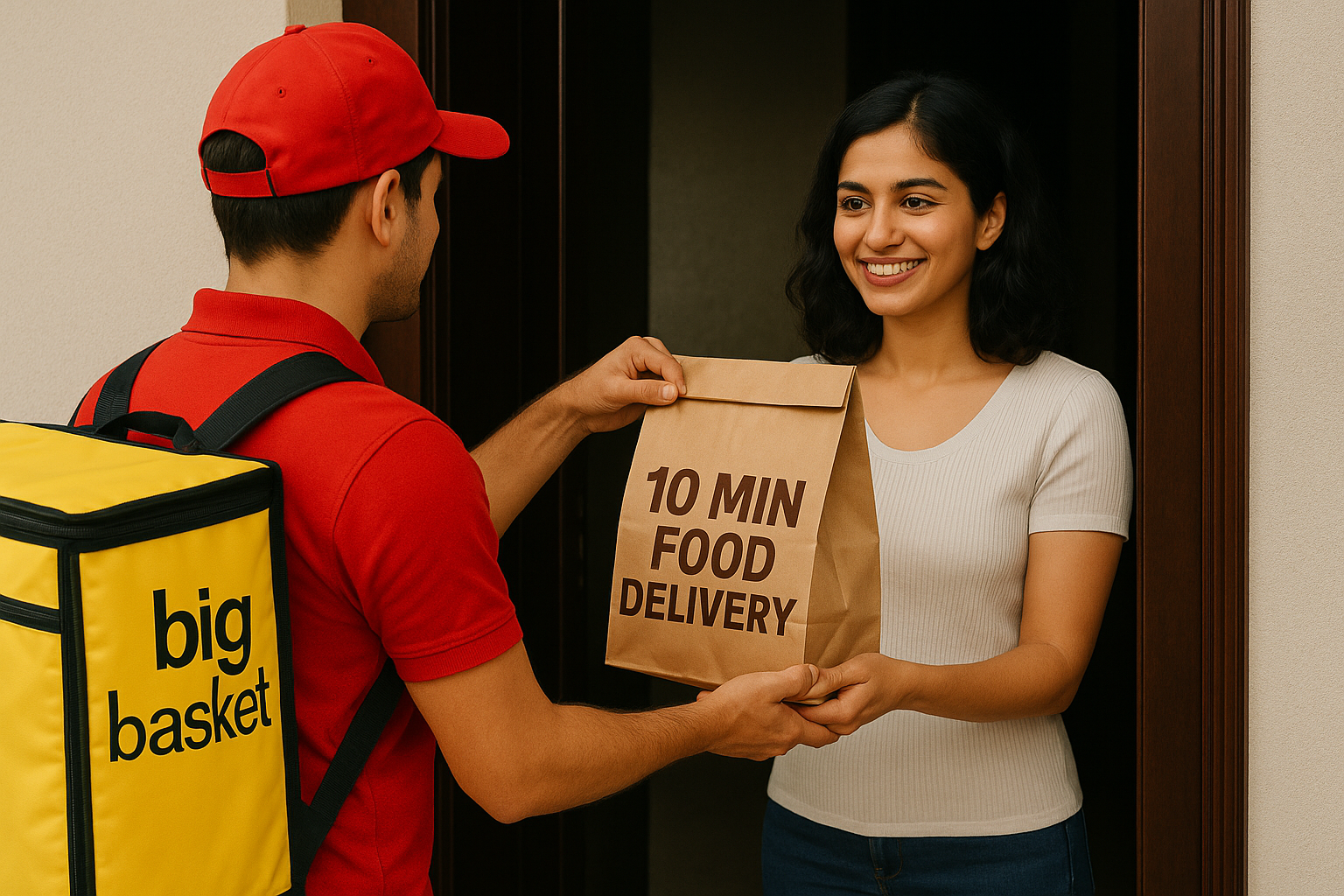Summary:
- BigBasket to launch 10-minute food delivery across India by March 2026, starting with Bengaluru.
- Entirely powered by Tata brands like Starbucks and Qmin—no external restaurant tie-ups.
- Plans to grow dark stores from 700 to 1,200 to support lightning-fast orders.
- No new investors; IPO planned within 24 months, backed by internal funding.
It’s a Monday evening in Bengaluru. The skies have cracked open with a summer drizzle. You’re tired, hungry, and scrolling through your phone. A steaming bowl of biryani pops up on your screen—Qmin, the Tata-owned kitchen brand, promises it in under ten minutes. You blink. It arrives before the rain stops.
This is the new world BigBasket is trying to create.
A familiar name in Indian households for groceries, BigBasket now wants to feed India’s instant cravings—not just rice and flour, but hot meals, brewed coffee, and snacks at lightning speed. And it wants to do it faster than Swiggy, Zomato, Blinkit, or Zepto.
Behind the Scenes: Speed, Yes—But with Control
Unlike other players who rely on food courts and third-party restaurants, BigBasket is taking a different route. The menu? Only brands from the Tata stable: Qmin for meals and Starbucks for your latte fix. This means the company controls every step of the process—from kitchen to doorbell.
“Quick delivery isn’t enough anymore,” said Vipul Parekh, BigBasket’s co-founder. “We want to deliver with consistency and quality. That’s why we’re not outsourcing food.”
To make this happen, the company is scaling up what it calls dark stores—small warehouses nestled inside city blocks that serve as the launchpads for ultra-fast deliveries. Bengaluru already has 700 of these; BigBasket wants to push that number to 1,200 by the end of 2025.
Forty of these stores will begin food delivery operations by July, giving the company a serious runway to prepare for the all-India rollout by March 2026.
The Competition Isn’t Sleeping Either
Of course, BigBasket isn’t alone. Swiggy is pushing hard with its Bolt and Snacc formats. Blinkit is pouring energy into Bistro. Zepto has launched Zepto Café, and Zomato just resurrected its instant delivery dreams through Zomato Quick.
But there’s one big difference: BigBasket doesn’t need to burn cash to compete.
“No outside investors. No new fundraising. We’re growing this with Tata’s support,” Parekh confirmed.
That’s a bold stance in a segment infamous for losses and high delivery costs. Yet, it may just be the secret to staying patient while competitors race to dominate.
The Bengaluru Experiment: Can This Really Work?
In May 2025, BigBasket quietly began testing 10-minute food delivery in select Bengaluru neighborhoods. The results surprised even the team—early data showed that 5 to 10 percent of existing grocery users began ordering food as well. No flashy marketing. Just a promise of speed, trust, and taste.
“We realized people already trust us with what’s in their kitchen. Why not what’s on their plate too?” said a company executive familiar with the pilot.
A Meal and a Mission
At its heart, BigBasket’s 10-minute journey isn’t just about speed. It’s about reclaiming your time. A warm cup of coffee before a meeting. A hot meal for a mother too tired to cook. A snack for a student pulling an all-nighter. And all of it, at your doorstep in less time than it takes to heat a microwave dinner.
With Tata’s backing, BigBasket isn’t rushing. It’s preparing—brick by brick, store by store—for a future where food comes as fast as thought.
And if it gets the execution right, it won’t just change how Indians eat. It might just change how they live



